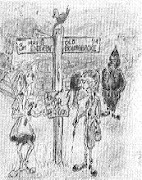

I cannot say. I do know that it sounds like the kind of book I’d like to dip into. Clive’s last offering, the title of which I’ve forgotten, dealt , at least in part, with the celebrities he interviewed some years back and he offered very funny accounts of his meetings with such as Burt Lancaster, Bob Mitchum ( we were very close) and Peter Sellers. Clive realised that they were all certifiably mad, of course, but writes of them with clear-eyed but sardonic affection.
I quite like Clive James. I know he’s Australian and a bit too concerned to show what a polymath he is, but he’s affable and intelligent, and I’d be quite happy to spend half an hour in his company. What I don’t like about him is that for a fat bloke, ten years older than I am, he seems to have incredible success with women.
Which leads me on to Jean-Paul Sartre (small picture), whom Clive James (and I) believe to be one of the least prepossessing characters of the twentieth century. Another unlikely Casanova, whose technique was probably to persuade young female students that to sleep with him was a sign of their liberation from bourgeois morality. I expect he failed to mention that such behaviour has characterised not only bourgeois, but also aristocratic and proletarian society since the dawn of time.
It’s one of those strange facets of French culture, namely the 'celebritisation' - is that a word? - of the intellectual. I suppose the last celebrity intellectual we had in Britain was Bertrand Russell, another one who powers of logic were so powerful that women had difficulty arguing that their virtue was worth hanging onto. (I’m beginning to think I should take French lessons, do a PhD in philosophy and carry a joke book around with me.)
I seem to be having trouble sticking to the point.
When I first came across Jean-Paul’s ideas, or the ideas that he propagated, I had to agree with him. There’s no God, or at least no transcendent being that we can know or who’s bothered about us. So it follows that there’s no purpose in life and no absolute morality, no meaning and no hope. And no such thing as human nature. We’re on our own. But we are free. ‘Nothing ain’t worth nothing, but it’s free’ is another way of putting it. Or, ‘Life is a tale told by an idiot, full of sound and fury, signifying nothing.’ Or, 'As flies to wanton boys are we to the gods. they kill us for their sport.' Am I starting to sound like Clive James yet?
So, we’re full of angst and despair, but we’re free. Now what? J-P’s first advice is good. Don’t flee into the arms of some religion, ideology or morality that gives you a spurious sense of meaning and purpose. That’s what he calls ‘bad faith’. Existence before Essence. ‘What are you going to do now?’ someone once asked Indiana Jones. ‘I don’t know – I’m making this up as I go along,’ he replies. In other words, I, for example, am not a Blogger. I am one who blogs.
But then Sartre loses it. Like Descartes before him, he’s good at clearing away the undergrowth of received opinion and wishful thinking, but then proceeds to build an equally untenable edifice upon it. He advises creating meaning for ourselves by artistic creation and by political engagement, preferably both at the same time. And by political engagement he means embracing every lunatic left-wing cause that offers its ugly charms to him.
Having pontificated at length about intellectual freedom and campaigning against France’s occupation of Algeria, he ends up a fellow-traveller of the Communist Party, one of Lenin’s ‘useful idiots’, justifying the gulags and handing out propaganda tracts on the street for the benefit of the TV cameras.
Sartre was an ugly, mean-spirited little man, who used his intellectual powers to justify his prejudices and bully others into sharing them. He claimed that ‘existentialism is a kind of humanism’, but contributed to some of the greatest inhumanities ever perpetrated. His great rival, Albert Camus (large picture), was another left-winger but he actually liked people and loved life. He was prepared to condemn cruelty and injustice wherever he found it. Individuals before ideology was his mantra.
I read that just before he died in a car crash, Camus wrote to five different women assuring each of his undying devotion. I doubt he was lying to any of them.

1 comment:
nice blog
Post a Comment